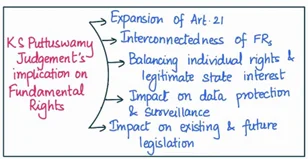Answer:
| Approach:
Introduction
- Introduce the Supreme Court’s Right to Privacy judgment (Justice K.S. Puttaswamy (Retd.) vs Union of India) and its significance in the context of Fundamental Rights in India.
Body
- Discuss the implications of the judgment on the scope of Fundamental Rights.
Conclusion
- Conclude, emphasizing the continued importance of privacy in the interpretation and enforcement of Fundamental Rights in India.
|
Introduction:
The Right to Privacy judgment by the Supreme Court of India in 2017 (Justice K.S. Puttaswamy (Retd.) vs Union of India) marked a significant milestone in the interpretation and scope of Fundamental Rights in India. The nine-judge bench unanimously recognized the Right to Privacy as an intrinsic part of the Right to Life and Personal Liberty under Article 21 of the Constitution.
Body:
The Puttaswamy case or the Right to Privacy judgment has had broad implications on the scope of Fundamental Rights in India:

- Expansion of Article 21: The Right to Privacy judgment reaffirms the expansive interpretation of Article 21, which encompasses not just the right to life but also the right to live with dignity, personal liberty, and privacy.
- Interconnectedness of Fundamental Rights: By acknowledging that privacy is essential to the meaningful exercise of these rights, the judgment underscores the importance of a holistic approach to interpreting and safeguarding Fundamental Rights.
- Balancing individual rights and legitimate state interests: While recognizing the Right to Privacy as a Fundamental Right, the judgment also acknowledges the need to balance individual rights with legitimate state interests, such as national security, public order, and the protection of the rights of others.
- Impact on existing and future legislation: For example, the judgment prompted a reconsideration of the constitutional validity of Section 377 of the Indian Penal Code, which criminalized consensual same-sex relationships. In 2018, the Supreme Court decriminalized homosexuality in the landmark Navtej Singh Johar vs Union of India case, citing privacy as a key factor in its decision.
- Influence on data protection and surveillance: The court’s recognition of informational privacy has prompted discussions about a robust data protection framework and the need to regulate state and private surveillance.
Conclusion:
The Supreme Court’s Right to Privacy judgment has implications on various domains, including data protection, surveillance, and personal freedom, and will continue to shape the interpretation and enforcement of Fundamental Rights in the country.
